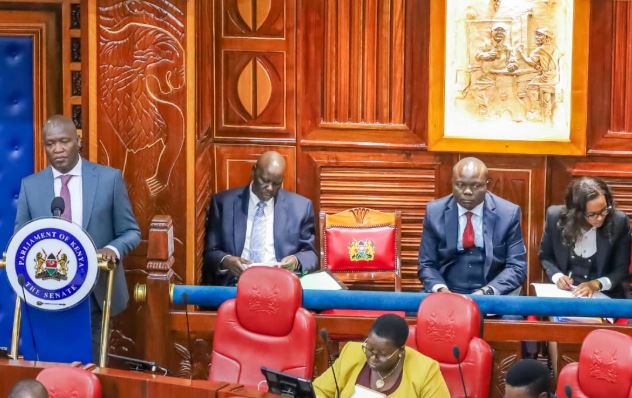

It was a high-stakes week in Parliament, with the Senate at the centre of national attention as it undertook the impeachment trial of Kericho Governor Erick Mutai.
The Governor, who was facing the second impeachment trial, survived the threat after 25 MCAs voted to support his claim that the two-thirds threshold was not met in impeaching him from office.
16 Senators voted against his claim, while one senator abstained.
The majority of the senators who spoke agreed with the Governor's presentation that the number of MCAs who voted was unclear, a reason they say was enough to save the governor.
This is despite the IT expert sourced from the ICT Authority saying that the number of MCAs who voted were 33.
The County Assembly only needed 32 MCAs to meet the two-thirds threshold.
Governor Mutai produced 18 MCAs as witnesses during the trial as witnesses. The group maintained that they did not vote during the proceedings at the County Assembly.
Senate committees are also conducting critical oversight missions across the counties in the sectors of ICT, agriculture, and food security.
The spotlight remained firmly fixed on the Senate chamber as Governor Erick Mutai faced his second impeachment trial in less than a year.
Appearing before the Senate plenary on Wednesday, August 27, Mutai strongly denied charges levelled against him by the Kericho County Assembly, which include gross violation of the Constitution, abuse of office, and gross misconduct.
During the opening session, Clerk of the Senate Jeremiah Nyegenye formally read out the charges.
Mutai, in a spirited rebuttal, pleaded not guilty and dismissed the accusations as politically motivated.
On Thursday, August 28, the governor mounted a vigorous defence, focusing particularly on the legality of electronic voting used by Members of the County Assembly (MCAs) to pass the impeachment motion. His legal team questioned the constitutional basis and technical integrity of the process.
“The voting process was so deficient and manipulated that the Senate cannot rely on it,” Mutai’s lawyer, Katwa Kigen, told senators.
Over three intense days, Senators heard testimonies and conducted cross-examinations from both the County Assembly and the governor’s legal representatives.
The Senate is expected to cast a decisive vote on whether the two-thirds threshold necessary to remove a governor from office has been met. The verdict will determine whether Mutai survives a second impeachment bid.
Away from the plenary, the Senate Standing Committee on Information, Communication and Technology (ICT), chaired by Senator Allan Chesang (Trans Nzoia), conducted a significant oversight visit to Kiambu County.
The committee evaluated the county’s Enterprise Resource Planning (ERP) system, which has transformed revenue collection and service delivery.
Kiambu Governor Kimani Wamatangi briefed the Senators on the system’s impact, noting that the county’s own-source revenue rose impressively from Sh2.9 billion in 2021 to Sh5.4 billion in the 2023/24 financial year.
Chesang lauded the Sh230 million system—which includes software, hardware, and two data centres—as a national benchmark in digital governance.
He emphasised the importance of county ownership of the ERP and its source code, which Wamatangi highlighted as key to ensuring sustainability and independence from vendors.
The system integrates essential functions such as licensing, health management, fleet oversight, bursary allocation, land approvals, and more.
Meanwhile, the Senate Standing Committee on Agriculture, Livestock and Fisheries, chaired by Senator David Wakoli (Bungoma), initiated a county tour starting in Uasin Gishu.
During a visit to the National Cereals and Produce Board (NCPB) depot in Eldoret, the committee assessed grain storage conditions, reserve volumes, and fertiliser distribution.
The Senators sought assurances on aflatoxin control, food safety compliance, and resilience planning against climate-related shocks.
The following day, the committee visited the Kenya Seed Company Limited in Kitale, where discussions focused on revitalising the seed production sector.
Several challenges were highlighted, including aging asbestos roofing requiring replacement, delayed payments to seed growers, and limited acreage for seed cultivation.
Senators called on counties to collaborate in providing land and urged expansion of irrigation to improve output.
Kenya Seed’s management informed the committee of a Sh1.7 billion debt owed by both national and county governments—a backlog that has hindered growth and liquidity.
Additionally, concerns were raised about the spread of counterfeit seeds, the condition of farm access roads, and the insufficient distribution of certified seeds, all of which threaten national food security.













